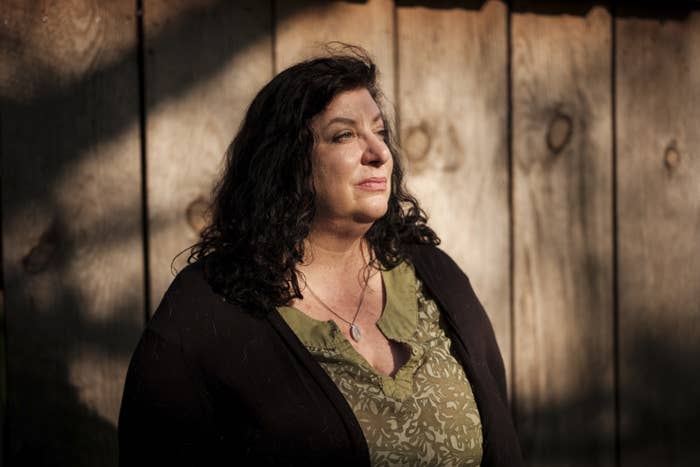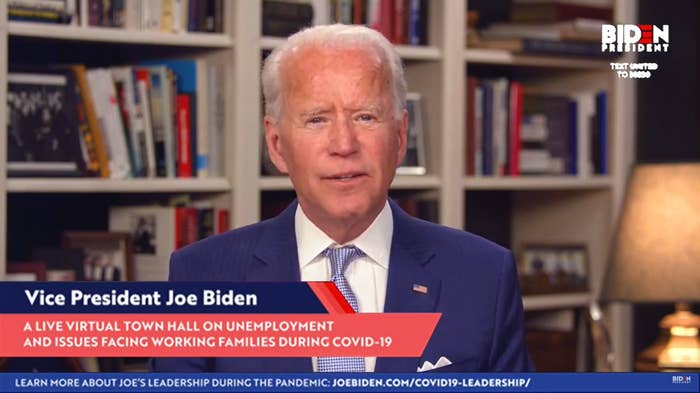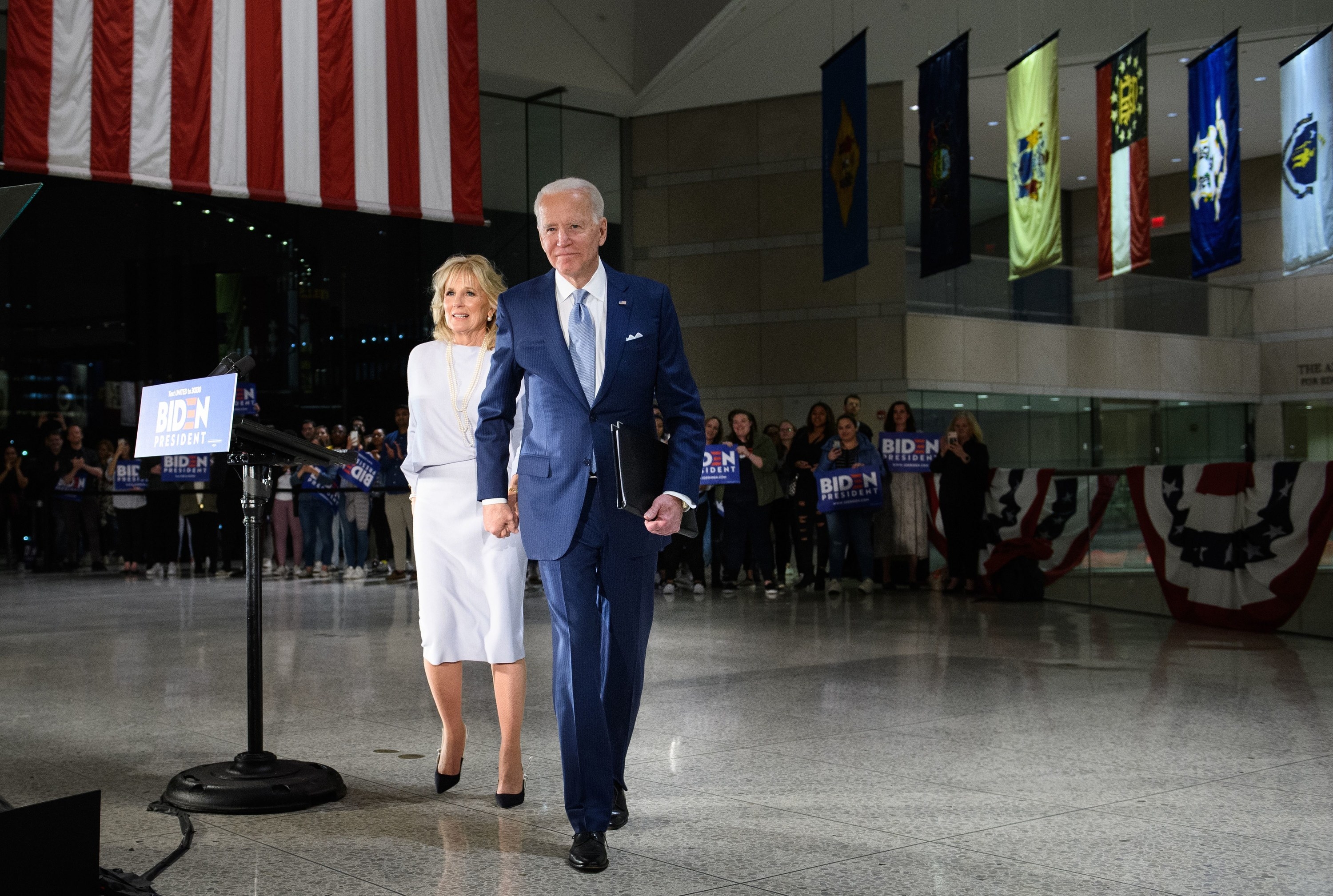
She has seen Joe Biden take questions on cable news and late-night television. She has seen him host virtual town halls with voters and online fundraisers with donors. And from her home in California, where she is keeping a daily watch on Twitter, Tara Reade has been waiting for someone — anyone — to ask the former vice president about her story.
“He was on television twice today. No one asked him. No one’s asking the question,” Reade said in a phone interview earlier this month. “No one’s even posing the question.”
On that particular day, Biden sat for an interview with Joe Scarborough and Mika Brzezinski on MSNBC’s Morning Joe, appeared on a CNN coronavirus town hall with Anderson Cooper, and took questions during a 45-minute fundraiser with dozens of donors.
More than a month after Reade first detailed a serious allegation of sexual assault, Biden is set to address the subject in a Morning Joe interview scheduled for Friday morning. For weeks, he didn’t receive a question about the claims, despite doing multiple interviews.
Reade, who has fielded dozens of requests from reporters this month, said she is acutely aware that her allegations pose complex terrain for the “mainstream media’s” coverage of a Democratic Party that has long viewed both Biden as a beloved figure and President Donald Trump as a man accused of sexism and more than a dozen instances of sexual harassment and assault.
As Democrats came to Biden’s defense this month as an advocate for women — marking a turn for a party that has embraced the notion of “believing women” as a baseline posture in the #MeToo era — Reade said she believes her story has been given short shrift compared to other accusations of sexual abuse against powerful figures. She named as an example Christine Blasey Ford, the woman who said she was sexually assaulted by Supreme Court Justice Brett Kavanaugh, then Trump’s nominee to the court. After seeing her story refracted through the lens of Political Twitter, Reade said in a series of interviews this month, she’s felt “marginalized,” “smeared,” and “discounted” — betrayed by Democrats she said she once admired.
“It was really devastating when [Kirsten] Gillibrand and Stacey Abrams and Hillary Clinton, all on the same day, just basically implied my story wasn't true and they believe Joe Biden. I can’t describe to you what that felt like,” Reade said on Thursday, describing herself as a “lifelong Democrat” and in particular a fan of Abrams', the former Georgia House minority leader who has been campaigning to serve on the ticket with Biden as his vice presidential nominee.
“I just— I’m stunned,” Reade said. “They didn't just say, ‘Oh, we're standing with Joe Biden until we hear more.’ They just discounted me. They marginalized me. They said they didn't believe me. I can't tell you,” Reade said, trailing off. “I cried for a while because they're important in my life. They've been figures that I looked up to.”

At points over the last month, Reade has been scrutinized as much as her allegations. Some Democrats have pointed to her pro–Bernie Sanders tweets (“Bernie stay in!” she tweeted in late March), her writings praising Vladimir Putin (she told BuzzFeed News earlier this month that she had changed her views about Putin after reading writers like Julia Ioffe and Russian opposition activist Alexei Navalny), and her decision to first seek a platform for her story on left-wing media outlets like Katie Halper’s podcast (“She's very trauma-informed,” she says of Halper) as markers of her credibility. Reade, a 56-year-old who says she put herself through law school as a single mother and still has hundreds of thousands of dollars in student and medical debt, says she is not ashamed to identify herself as “a working-class poor person.”
She has followed the online discussion, political and academic, over the ways in which survivors are received in the public square.
“I am not an ‘imperfect victim,’” Reade tweeted on Tuesday.
Reade has accused Biden of digitally penetrating her in a Senate hallway when she was a staff assistant in his Senate office in 1993. She has said she filed a Senate personnel report at the time, told others in the office about the incident, and was removed from her duty of overseeing the interns.
The Biden campaign has said the incident did not happen. Three former Senate aides, all of whom Reade said she complained to directly at the time, have said they don’t remember any such complaint or that it did not take place. One of them, Biden’s former executive assistant from 1982 to 2000, Marianne Baker, said in a statement provided by the campaign that she never once witnessed or heard of “any reports of inappropriate conduct, period — not from Ms. Reade, not from anyone.”
Subsequent reporting has corroborated elements of Reade’s story. Former interns from the Senate office remember Reade being reassigned away from managing them, according to the New York Times. After Reade mentioned that her mother had called into Larry King Live, the Intercept published the transcript from a 1993 episode where a caller described her daughter’s negative experience with a “prominent senator,” though the caller does not detail the nature of the experience.
Across different outlets, people who knew Reade have said she told them that she had had a bad experience with her boss in Washington — with varied levels of detail. In an interview with Business Insider, a former neighbor, Lynda LaCasse, said Reade detailed her full allegation against Biden in the 1990s. The New York Times and Washington Post each reported they spoke with an unnamed friend who had said Reade told her about the allegation in the 1990s as well.
Others have provided more limited accounts — one friend told the Washington Post, for instance, that she remembered Reade saying Biden touched her arm and behaved inappropriately, but did not have other details. Reade’s brother initially told the Post he remembered her telling him that Biden was “inappropriate,” but followed up days later to clarify that he recalled Reade telling him that the then-senator had put his hands under her clothes.
Through it all, Biden himself has remained silent. Publicly, aides have referred reporters back to a single statement, dated April 13, saying that while the former vice president believes women should have the space to tell their stories, this incident didn’t occur. Privately, they have distributed talking points to other Democrats advising them to rely on a New York Times investigation and to (inaccurately) insist the article concluded the incident never happened.
Though the mainstream media has now started to aggressively cover the story, Reade has been disappointed with the length of time it took major news outlets to cover her allegation, as well as the tone of some of the coverage.
Last year — when other women had come forward to say Biden had touched them in a way that made them uncomfortable — Reade told her local paper that while working for the former senator, he touched her neck and shoulders. In the same 2019 column, she said a supervisor told her that Biden wanted her to serve drinks at an event because he liked the way she looked. When she refused, Reade told the newspaper, her responsibilities were reduced.
This spring, she turned to leftist outlets to tell her serious allegation of sexual assault by Biden, appearing on Halper’s podcast and Democracy Now.
“I used to think that a Republican talking point was to call the mainstream media biased,” Reade said. “So I used to think, Oh, that's just a talking point for them. I don't believe it. But now I'm living it [in] real time, and I see it — like, I see it for what it is. Because I am a Democrat, or I was. But now I'm not anything, really. I’m politically homeless.”

Reade said she doesn’t intend to vote in the national election in November but will vote in local elections. In one recent interview, she identified herself as a supporter of Elizabeth Warren during this year’s Democratic primary. She later supported Bernie Sanders.
The TV network that has asked her on most frequently, she said, has been Fox News. She said Thursday that she's received four or more invitations from the station to come on air. Only in the last day or two have other TV networks expressed interest; early on Thursday, Reade said she had just received and was discussing an invitation from ABC News, had been contacted by MSNBC that morning, and CBS News had reached out to her the previous night. (Asked about their bookings, CNN and ABC News said they do not comment on such practices.)
Later, after the announcement that Biden would address the allegations on Morning Joe, Reade said she had now received invitations to come on air from all of the major networks; she said she was still deciding where to do her first on-air interview and would likely make a decision by Thursday evening.
So far, Reade has declined the Fox News invitations, which she said had been from shows such as Hannity and Tucker Carlson. “I'm not on Fox. I'm not cooperating with Republicans, because I'm not interested in my story being politically hijacked,” Reade said earlier this month. “I want a safe platform to tell my full history with Joe Biden.”
Reade was quoted in the New York Times on Thursday as saying that she plans to do her first on-air interview with Fox News this weekend — but she told BuzzFeed News the same day, shortly after the Times piece posted, that she “hasn’t made a decision about that.”
Though Reade said on Thursday that she’s “honored to be invited on a national show” and has expressed gratitude to Fox News for inviting her, she is “having to cut through the political noise and people trying to call it partisan politics.” She’d been “pigeonholed” as a “Bernie Bro,” she said, because she’d initially spoken to independent left media, and “then there was this new narrative that it's only the conservative press, which is pegged by some media as being Fox, you know, to lift my voice. And so I've been wanting to find a platform that's more neutral.”
She is still, she said, handling press requests on her own — no lawyer, no publicist. She said she doesn’t have a television, adding, “I have to look up names to see who people are because I’m not in that world, it’s not my world. So I'm learning a lot. And what I would say is that there hasn't been a lot to field, it's been mostly print that has called me and very little television, if any at all.”
Her daughter recently taught her the word “doxing,” she said earlier this month. Reade said she has received threats and been the subject of online harassment.
She’s found support among some prominent women whose stories came to light during the #MeToo wave. Actor Rose McGowan, who accused Harvey Weinstein of rape and reached a $100,000 settlement in 1997 that was a key part in the public case against him before he was ultimately convicted of rape and sexual assault, reached out to her shortly after she went public with her full allegation. The two connected for a phone call for two or three hours, McGowan said. They have kept in touch since.
“She's a very scared, damaged, traumatized woman, but I've seen her as time has gone just get stronger and stronger, and it's really great to see,” McGowan said in an interview on Wednesday. “She's challenging, you know, one of the most powerful men on earth. And when you mess with power, they mess back.”
McGowan said that Reade was being “belittled and dragged and positioned as just this kind of kooky — which of course they did to me — this kooky woman out there, you know, because she doesn't look like the more J.Crew friendly type of blonde they prefer.”
Reade has also been speaking to Sarah Ann Masse, another actor who also accused Weinstein of sexual abuse and was one of the lead plaintiffs in a class-action suit against him. “I do think the press is complicit in sort of not taking this as seriously as they've taken other stories of sexual violence in the past,” Masse said.
“I do think it's because Joe Biden is, you know — it might be because he's a Democrat. I think it's certainly because he's running against Donald Trump. And most people I know are horrified at the idea of four more years of the Trump presidency. He's an incredibly dangerous man. He is a sexual predator himself. So I think people have complex feelings about it. But to me, like nothing should be so dangerous that we can't talk about it."
UPDATE
This story has been updated to include more detail about the Weinstein case.

